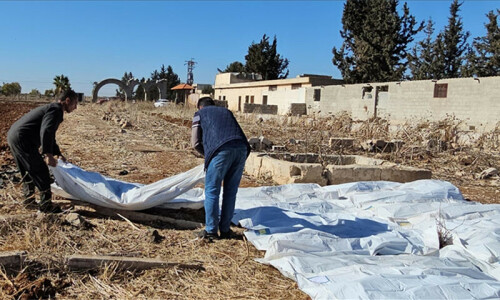ISLAMABAD, March 17: Reports from officials at the International Islamic University Islamabad (IIUI) suggest that the presidency of Dr Ahmed Yousif Al-Draiweesh, who can speak neither Urdu nor English, has been marked by language problems, cultural differences, and irregularities that have increased mistrust and suspicion between the university management and faculty.
The language barrier was the most pressing problem cited. “There are around 23,000 students in the university,” one official said, “most of whom cannot communicate with the president at all.”
Faculty members have also claimed to be affected, noting that those faculty who speak his native Arabic have “managed to get close” to him, a position from which they can influence policy.
University spokesman Hairan Khattak confirmed the president's language difficulties, but said they had caused no problems. Others seemed unconvinced.
One official, requesting anonymity, recounted a disturbing situation that took place around two weeks ago. “Dr Draiweesh attended a lecture and began to suspect that the professor was speaking in Urdu,” a fact which was later confirmed.
“Because IIUI policy is that teachers must lecture in either English or Arabic, Dr Draiweesh issued instructions to terminate the teacher.”
Eventually, “it was revealed that the professor was a member of the MS Urdu faculty, and was giving a lecture on that subject - which cannot be taught in any other language.” After what the official described as “a long discussion,” the professor was allowed to keep his position at the university.
Spokesman Hairan Khattak told Dawn that it was the president's prerogative to “remove or transfer any person if he feels that they are not working in the best interests of the university.”
Dr Al-Draiweesh's lack of fluency in English and Urdu has required the presence of “at least five” interpreters or translators, whose salaries are drawn from university funds.
“They translate every letter written to him, and they communicate on his behalf,” another official said. “But they translate for their own interests and have become very powerful.”
He mentioned that a written complaint of sexual harassment was filed against one faculty member, a former member of the Academic Staff Association. “The interpreters like [this professor], so we couldn't take any action against him.”
According to Dr Mohammad Iqbal, a former vice chancellor of Punjab University, effective administration requires communication. “If the president can't understand his teachers and students,” he asked, “how can he convey instructions to them, how can he guide them?”
He suggested, however, that this problem was larger than Dr Al-Draiweesh, and symptomatic of a larger problem with education in Pakistan.
Cultural differences have also marked Dr Al-Draiweesh's decisions. One official mentioned the case of a hostel provost whom a group of students accused of “watching a movie on the Internet, which is a minor crime in Pakistan; for one complaint, he should have received a warning.”
Because the crime is more serious in Saudi Arabia, Dr Al-Draiweesh removed the provost from his position.
Similarly, termination proceedings were initiated against the director of the university's finance wing, who is male, because he spoke to a female employee.
“The same thing happened to the director of human resources,” the official said. “He's been working here for the last 30 years but he was declared guilty of talking to a female employee. Now he's facing problems and might be terminated.”
Another university official alleged that IIUI management had proposed bringing new faculty members from Al-Imam Mohamed Ibn Saud Islamic University in Saudi Arabia.
Although Al-Draiweesh claims they will receive salaries from IMISI, “they'll still get allowances and benefits from IIUI,” the official said, before noting that there were qualified persons in Pakistan who could have been hired instead.
Dr Al-Draiweesh's own elevation to the position raised questions as well. Although presidency of IIUI was vacated in December 2010, when Dr Anwar Hussain Saddiqui retired from the position, it was not until 2012 that then Rector Professor Fateh Mohammad Malik advertised for candidates.
Around 50 applied, and in February, a search committee short-listed three of them. In October of that year, however, Dr Al-Draiweesh was appointed president.
“The search committee had formed, discussed candidates, short-listed them, interviewed them,” said an official from the administration wing. “Dr Al-Draiweesh's name wasn't even there.”












































Dear visitor, the comments section is undergoing an overhaul and will return soon.